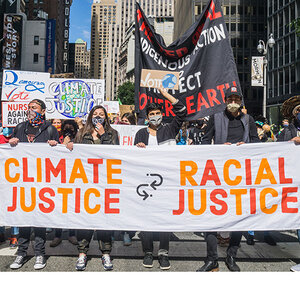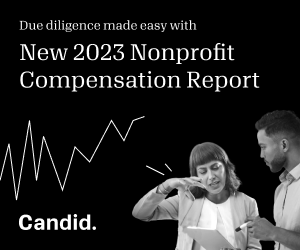Continuing the conversation: How philanthropy is changing how it talks about race

In June 2020, Rockefeller Philanthropy Advisors responded to questions in the sector about how to begin difficult conversations in the workplace. Our response was meant to provide guidance on how to talk about a reality that had left many of us in the philanthropic sector and beyond speechless. One in which the dual crises of the pandemic and racial injustice were shifting how we lived, thought, and yes, even breathed.
A little more than a year later, we are exploring how, if at all, these workplace conversations have evolved. As we enter yet another new reality, the most obvious shift in direction is to the talk of reopening (if we were privileged enough to work remotely). A friend recently shared a statement that captures what many of us are feeling: "Nothing should go back to normal. Normal wasn't working. If we go back to the way things were, we will have lost the lesson. May we rise up and do better."
It's the thought of losing the lesson that is most frightening. The brutality of the last year of loss, despair, economic insecurity, and revelations of deeply ingrained inequity can only make the tiniest bit of sense if we emerge with a willingness to rethink how we operate as a global community.
Navigating ambiguity
The uncertainty of 2020 has us craving the artificial safety that the construct of "normal" provides, but if we go that route, we run the risk of returning to behaviors that led us to this moment in the first place. Nor can we stay indefinitely in a state of suspended animation. Imagine, for example, if those of us who have been able to work remotely never went back to the office. What does that mean for building maintenance or security staff, small businesses that rely on office culture to provide a living for their employees, or public transportation, on which many frontline workers have had to rely? We have to rethink it all.
At the same time, conversations about race and inequity have taken on an urgency that cannot be ignored. As the world went into lockdown, personal and professional spaces merged and the norms around private trauma began to break down and forced conversations between colleagues that, while difficult, revealed truths long denied. Like Pandora's box, once opened, those conversations could never again be contained.
Changing the conversation on addressing race in philanthropy: Holding our breath
Like the murder of George Floyd, his murderer's trial in the spring of 2021 opened another level of conversation on race in this country. Emergency meetings were called in BIPOC communities. Plans were made for protests, and resources were gathered to hold one another together in the event that the verdict went against what the community needed. But as the day approached, talk was subdued as all eyes turned to the news.
It was as if the last breath exhaled by Mr. Floyd had made its way into our lungs as we held him and one another up — in fear and hope — while we waited to hear whether Black lives really did matter. When the verdict was announced, many of us released that breath we hadn't realized we'd been holding, but the disassociation necessary to focus on work while at the same time bracing for an eruption of pain and rage took a huge toll.
In the end, there was very little joy or celebration when the verdict came down, but a collective relieved sagging as we expelled the fear and the need to brace against yet another injustice.
But the respite was short-lived. Even as we sank down with relief, another wave of injustice came sweeping through, with the shootings of Andrew Brown, Jr., Daunte Wright, and Ma'Khia Bryant filling us with the breath of lives cut short, leaving us once again flailing against a system that sees us as not worth saving.
And the hits kept coming. The escalation of anti-Asian violence across the country added yet another layer of anxiety to our daily lives. A Japanese friend has, on occasion, gone into the office during lockdown. More often than not, he is left alone on his side of the subway car, as others crowd together across from him. While most employers would understand the need to take time off to heal and recover from a physical attack, have they taken into account the need to recover from the everyday racism that weighs us down and threatens to carry us under into a sea of despair?
Bracing against an attack that may never come is exhausting. Holding your head up as your fellow commuters indicate that they fear you more than a disease that has killed more than four million people globally is painful. Walking into your office and hearing, "It's so great to be getting back to normal" while bearing all of these experiences is debilitating.
The events of the last fourteen months have created a situation in which many of us live in two realities simultaneously: In one, we negotiate our grief, anger, and fear of the lesson not learned. In the other, we sit in meetings or work on deliverables so that we can negotiate our careers in a system that actively works against our ability to thrive.
Have we made progress?
As our personal and professional lives continue to intermingle, we increasingly look to our organizations to provide guidance and space around these difficult conversations. The philanthropic sector stepped up when almost all our institutions put out statements in support of Black and Asian communities in the last fourteen months, but the question of performative racial justice looms large. Are we, in fact, putting our money where our mouths are?
According to a Financial Times article with the headline "Are CEOs living up to the pledges they made after George Floyd's murder?," "American corporations have pledged to spend $50 billion on racial equity since Floyd's murder, according to a tally of public promises compiled by Creative Investment Research…Yet only about $250 million has actually been spent or committed to a specific initiative, according to an analysis by the research consulting firm."
Will we ever see the full $50 billion used to combat racial inequity? Or is it more likely that those funds will be redirected to "a more urgent need," once the attention garnered by those dollar figures dies down?
Internal accountability
It's not only our external commitments that are suspect. Members of the philanthropic community have started looking at their organizations and pledged to undertake their own diversity, equity, and inclusion (DEI) journeys. Unfortunately, much of the conversation has stalled at "diversity," with an over-reliance on touting numbers in a headcount rather than opening deeper conversations into pay equity, internalized white supremacy culture, or decision-making norms.
"When Just Capital released a 'tracker' of companies' commitments to racial equity earlier this month," the FT article notes, "it found that only 31 per cent of the country's 100 largest companies were analyzing how equitably they paid employees of different races and ethnicities." The article goes on to say that companies are much more comfortable disclosing anti-bias training plans than pay; in essence, they prefer to disclose how they talk about racial inequity rather than what they're doing to combat it.
Those conversations aren't going well, either. In a Catapult article, "Hiring a Chief Diversity Officer Won't Fix Your Racist Company Culture," Nadia Owusu writes: " Early in my tenure as a CDO, despite having been charged by higher-ups to facilitate workplace conversations about topics like white privilege, unconscious bias, and intersectionality, I was told — often by those same higher-ups — to 'tone down the incendiary language.'"
"Since I already knew that many colleagues of color desperately wanted the racism in our company culture to be openly addressed, I assumed my bosses largely meant that I should focus my efforts on bringing white people along," Owusu continues. "If I had to prioritize the comfort of white employees over the clearly expressed needs of employees of color; if I had to avoid speaking in unambiguous terms about the very problems that I was charged with solving; if staff meetings were not the 'right place' for open, honest dialogue about these issues — then what was I supposed to be doing?"
Pushing the envelope
How, then, do we combat the urge to give up when we discover that the conversations are harder than we thought possible? When we realize that achieving equity is the work of years or decades and not a few months? As we're discovering, there's no one clear path forward and no magic wand to wave to make racism disappear.
What we cannot do is stop listening to and talking with each other — even when we hear and say things that are painful, because that is the one path that leads nowhere.
If you're having trouble restarting the conversation, here are a few prompts to help:
On internal commitments:
- Do our stated values live in all levels of our organization?
- As we think about coming back into our offices, have we made plans and space for the anxiety that might accompany it?
- If we employee people of color, have we addressed the increased burden they bear in navigating a pandemic as well as everyday racism?
- What will it take to shift the conversation from headcount to pay equity?
On external commitments:
- If we have committed funds to combatting racial inequity, how far along are we in honoring that commitment?
- How important is it for our organization to commit to fighting racial inequity?
- Do we hold our partners accountable in upholding values that reflect a commitment to racial equity?
- As an organization, how are we or are we not showing up as leaders in our sector?
As we've discovered during these crises, no one person or organization can facilitate the conversations that will lead us toward a truly equitable society. But collectively, we can. It's time to continue these stalled and difficult conversations — because we can't afford to lose the lesson.
We have to rise up and do better.
Donita Volkwijn is the outgoing manager of knowledge management at Rockefeller Philanthropy Advisors.






